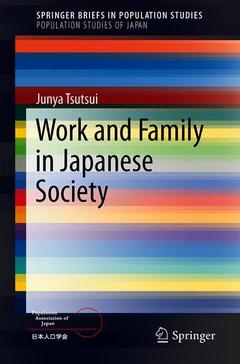Work and Family in Japanese Society, 1st ed. 2020 Population Studies of Japan Series
Auteur : Tsutsui Junya

This book provides a systematic framework for interpreting the fertility decline in Japan. It situates the change in fertility rates in a broader context, such as family life and working customs. The basic argument it puts forward is that Japan has failed to establish a ?dual-earner? society: women still face the trade-off between having a career or starting a family, which has led to an extremely low fertility rate in Japanese society.
Further to this rather common explanation, which could also be applied to other low-fertility societies such as Germany and Italy, the author presents an original view. Japan has had its own momentum in holding on to its strong ?men as breadwinners and women as housekeepers? model by creating a unique regime, namely, a Japanese model of a welfare society. This regime places special emphasis on the welfare provided by private companies and family members instead of by the government. Private firms are expected to secure men?s jobs and income to the greatest extent, taking advantage of Japanese employment customs. On the other hand, women are expected to provide care for their family members. The book argues that the familialist orientation is still dominant in Japan and is repeatedly reinforced in the policy context.
Situates the low birthrate phenomenon in Japan in the broader context of working conditions and family formation
Captures the characteristics of Japanese society from the comparative perspective of welfare regime theory and links this argument with the low-fertility problem
Approaches the current trend in family policies as re-familialization and discusses its consequences
Date de parution : 12-2019
Ouvrage de 61 p.
15.5x23.5 cm



